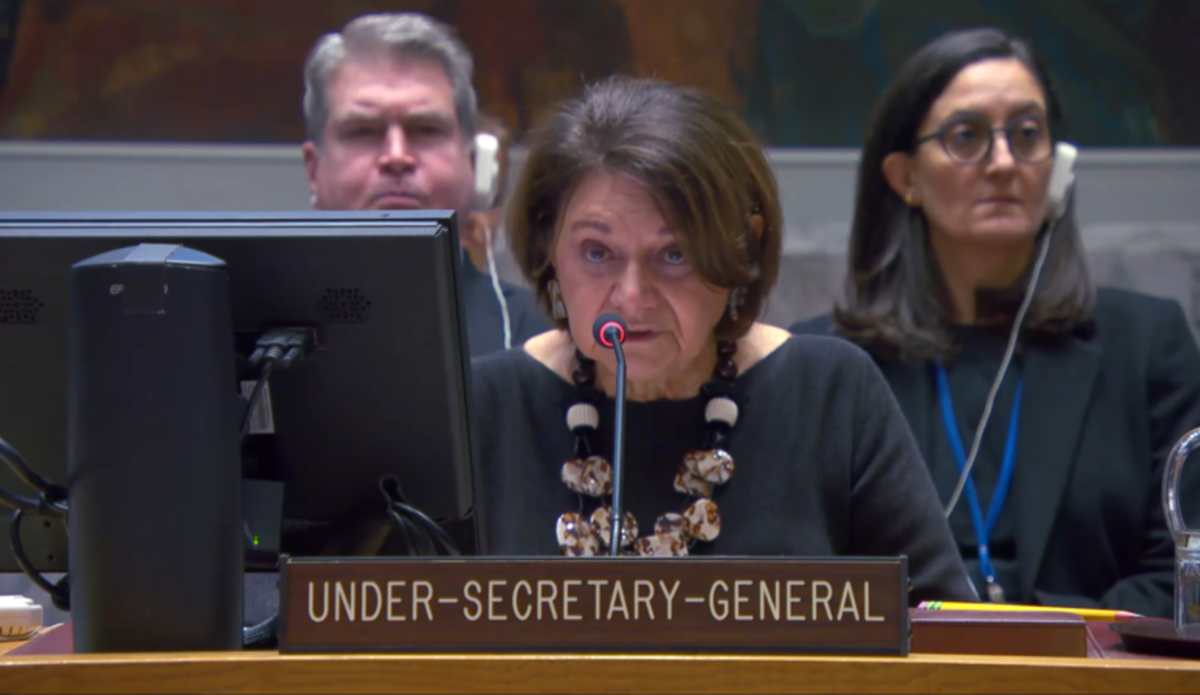Under-Secretary-General Rosemary A. DiCarlo's remarks
to the Security Council briefing on the Sudan and South Sudan
New York, 12 November 2024
Thank you, Mister President
The last time the Council discussed the situation in Sudan was only two weeks ago.
That is not a long time in absolute terms, but it is an eternity for the millions of Sudanese enduring unrelenting violence and suffering.
As the Secretary-General said in this chamber on 28 October, Sudan is trapped in a nightmare.
The latest wave of attacks by the Rapid Support Forces in eastern Al-Gazira State has been marked by what non-governmental organizations have described as some of the worst, most extreme violence in the last 18 months.
Large numbers of civilians have been killed. Even more have lost their homes and been forced to flee.
We are receiving reports of horrific violations of international human rights and humanitarian law, including sexual violence committed predominantly against women and girls.
Fighting also continues in El Fasher, Khartoum and other areas where civilians are subjected to appalling suffering.
We strongly condemn the Rapid Support Forces’ continued attacks against civilians. We also strongly condemn the Sudanese Armed Forces’ indiscriminate airstrikes in populated areas.
We are appalled by the attacks against civilians perpetrated by forces affiliated with the Sudanese Armed Forces in the Khartoum area.
Let me stress that both warring parties bear responsibility for this violence.
The people of Sudan need an immediate ceasefire. An end to the fighting is the most effective way of protecting civilians.
It is long past time for the warring parties to come to the negotiating table. The only path out of this conflict is a negotiated political solution.
However, both the Sudanese Armed Forces and the Rapid Support Forces seem convinced they can prevail on the battlefield.
As the end of the rainy season approaches, the parties continue to escalate their military operations, recruit new fighters and intensify their attacks.
This is possible thanks to considerable external support, including a steady flow of weapons into the country.
To put it bluntly, certain purported allies of the parties are enabling the slaughter in Sudan. This is unconscionable, it is illegal, and it must end.
While the parties might not be ready for a negotiated settlement, Sudan’s partners have a responsibility to press them to work for one.
We welcome the efforts of the African Union and IGAD to restore an inclusive Sudanese political dialogue – an essential process to rebuild Sudan’s democratic transition with civilians at its heart.
We also commend the Aligned for Advancing Lifesaving and Peace in Sudan (ALPS) Group for promoting implementation of the Jeddah Declaration and other key issues.
Still, peacemaking efforts remain mostly fragmented. The warring parties profit from multilateral disunity and the lack of coordinated action.
The need for greater convergence is blindingly clear.
The Personal Envoy of the Secretary-General for Sudan, Ramtane Lamamra, continues his efforts to close this loophole.
In this regard, the meetings of the Sudan Consultative Group, expected before the end of the year, will provide a crucial opportunity for enhanced coordination among multilateral organizations and key Member States.
Mister President,
The report of the Secretary-General to the Security Council on the protection of civilians in Sudan contains solid recommendations.
We have a collective responsibility to step up our efforts to operationalize them. To that end, I welcome the initiative to advance a new resolution on this matter.
We also need urgent progress on the implementation of the Jeddah Declaration. The parties must finally act on their commitments to protect civilians.
The establishment of a compliance mechanism agreed by the warring parties, with the support of key partners, would be a critical step to hold the parties accountable to their commitments.
At the same time, in the absence of a nationwide ceasefire, we urgently need progress on local ceasefires that could give civilians some respite, create avenues for dialogue and potentially lay the ground for a more comprehensive agreement.
Personal Envoy Lamamra is considering the next phase of his engagement with the warring parties, including another round of “proximity talks” focused on commitments related to the protection of civilians.
He will travel to Sudan and other locations in the region in the coming weeks to meet with key stakeholders. He will also closely engage with Sudanese civilian groups to ensure their perspectives are reflected in his endeavours.
Mister President, and the Members of the Council,
The continued support of the Security Council for Personal Envoy Lamamra is crucial. The immensity of this tragedy compels to do all that we can to bring it to an end.
Thank you.

